Kitabı oku: «Unto This Last, and Other Essays on Political Economy», sayfa 15
Section III.—RICHES
According to the various industry, capacity, good fortune, and desires of men, they obtain greater or smaller share of, and claim upon, the wealth of the world.
The inequalities between these shares, always in some degree just and necessary, may be either restrained by law (or circumstance) within certain limits; or may increase indefinitely.
Where no moral or legal restraint is put upon the exercise of the will and intellect of the stronger, shrewder, or more covetous men, these differences become ultimately enormous. But as soon as they become so distinct in their extremes as that, on one side, there shall be manifest redundance of possession, and on the other manifest pressure of need,—the terms "riches" and "poverty" are used to express the opposite states; being contrary only in the manner of the terms "warmth" and "cold"; which neither of them imply an actual degree, but only a relation to other degrees, of temperature.
Respecting riches, the economist has to inquire, first, into the advisable modes of their collection; secondly, into the advisable modes of their administration. Respecting the collection of national riches, he has to inquire, first, whether he is justified in calling the nation rich; if the quantity of money it possesses relatively to that possessed by other nations be large, irrespectively of the manner of its distribution. Or does the mode of distribution in any wise affect the nature of the riches? Thus, if the king alone be rich—suppose Crœsus or Mausolus—are the Lydians and Carians therefore a rich nation? Or if one or two slave-masters be rich, and the nation be otherwise composed of slaves, is it to be called a rich nation? For if not, and the ideas of a certain mode of distribution or operation in the riches, and of a certain degree of freedom in the people, enter into our idea of riches as attributed to a people, we shall have to define the degree of fluency or circulative character which is essential to their vitality; and the degree of independence of action required in their possessors. Questions which look as if they would take time in answering. And farther. Since there are two modes in which the inequality, which is indeed the condition and constituent of riches, may be established—namely, by increase of possession on the one side, and by decrease of it on the other—we have to inquire, with respect to any given state of riches, precisely in what manner the correlative poverty was produced; that is to say, whether by being surpassed only, or being depressed, what are the advantages, or the contrary, conceivable in the depression. For instance, it being one of the commonest advantages of being rich to entertain a number of servants, we have to inquire, on the one side, what economical process produced the poverty of the persons who serve him; and what advantage each (on his own side) derives from the result.
These being the main questions touching the collection of riches, the next, or last, part of the inquiry is into their administration.
They have in the main three great economical powers which require separate examination: namely, the powers of selection, direction, and provision.
A. Their power of Selection relates to things of which the supply is limited (as the supply of best things is always). When it becomes matter of question to whom such things are to belong, the richest person has necessarily the first choice, unless some arbitrary mode of distribution be otherwise determined upon. The business of the economist is to show how this choice may be a Wise one.
B. Their power of Direction arises out of the necessary relation of rich men to poor, which ultimately, in one way or another, involves the direction of, or authority over, the labour of the poor; and this nearly as much over their mental as their bodily labour. The business of the economist is to show how this direction may be a Just one.
C. Their power of Provision or "preparatory sight" (for pro-accumulation is by no means necessarily pro-vision), is dependent upon their redundance; which may of course by active persons be made available in preparation for future work or future profit; in which function riches have generally received the name of capital; that is to say, of head- or source-material. The business of the economist is to show how this provision may be a Distant one.
The examination of these three functions of riches will embrace every final problem of political economy;—and, above, or before all, this curious and vital problem,—whether, since the wholesome action of riches in these three functions will depend (it appears) on the Wisdom, Justice, and Far-sightedness of the holders; and it is by no means to be assumed that persons primarily rich, must therefore be just and wise,—it may not be ultimately possible so, or somewhat so, to arrange matters, as that persons primarily just and wise, should therefore be rich.
Such being the general plan of the inquiry before us, I shall not limit myself to any consecutive following of it, having hardly any good hope of being able to complete so laborious a work as it must prove to me; but from time to time, as I have leisure, shall endeavour to carry forward this part or that, as may be immediately possible; indicating always with accuracy the place which the particular essay will or should take in the completed system.
II.
NATURE OF WEALTH, VARIATIONS OF VALUE, THE NATIONAL STORE, NATURE OF LABOUR, VALUE AND PRICE, THE CURRENCY
The last paper having consisted of little more than definition of terms, I purpose, in this, to expand and illustrate the given definitions, so as to avoid confusion in their use when we enter into the detail of our subject.
The view which has been taken of the nature of wealth, namely, that it consists in an intrinsic value developed by a vital power, is directly opposed to two nearly universal conceptions of wealth. In the assertion that value is primarily intrinsic, it opposes the idea that anything which is an object of desire to numbers, and is limited in quantity, may be called, or virtually become, wealth. And in the assertion that value is secondarily dependent upon power in the possessor, it opposes the idea that wealth consists of things exchangeable at rated prices. Before going farther, we will make these two positions clearer.
First. All wealth is intrinsic, and is not constituted by the judgment of men. This is easily seen in the case of things affecting the body; we know that no force of fantasy will make stones nourishing, or poison innocent; but it is less apparent in things affecting the mind. We are easily—perhaps willingly—misled by the appearance of beneficial results obtained by industries addressed wholly to the gratification of fanciful desire; and apt to suppose that whatever is widely coveted, dearly bought, and pleasurable in possession, must be included in our definition of wealth. It is the more difficult to quit ourselves of this error because many things which are true wealth in moderate use, yet become false wealth in immoderate; and many things are mixed of good and evil,—as, mostly, books and works of art,—out of which one person will get the good, and another the evil; so that it seems as if there were no fixed good or evil in the things themselves, but only in the view taken, and use made of them. But that is not so. The evil and good are fixed in essence and in proportion. They are separable by instinct and judgment, but not interchangeable; and in things in which evil depends upon excess, the point of excess, though indefinable, is fixed; and the power of the thing is on the hither side for good, and on the farther side for evil. And in all cases this power is inherent, not dependent on opinion or choice. Our thoughts of things neither make, nor mar their eternal force; nor—which is the most serious point for future consideration—can they prevent the effect of it upon ourselves.
Therefore, the object of special analysis of wealth into which we have presently to enter will be not so much to enumerate what is serviceable, as to distinguish what is destructive; and to show that it is inevitably destructive; that to receive pleasure from an evil thing is not to escape from, or alter the evil of it, but to be altered by it; that is, to suffer from it to the utmost, having our own nature, in that degree, made evil also. And it will be shown farther that, through whatever length of time or subtleties of connexion the harm is accomplished (being also less or more according to the fineness and worth of the humanity on which it is wrought), still, nothing but harm ever comes of a bad thing.
So that, finally, wealth is not the accidental object of a morbid desire, but the constant object of a legitimate one.71 By the fury of ignorance, and fitfulness of caprice, large interests may be continually attached to things unserviceable or hurtful; if their nature could be altered by our passions, the science of Political Economy would be but as the weighing of clouds, and the portioning out of shadows. But of ignorance there is no science; and of caprice no law. Their disturbing forces interfere with the operations of economy, but have nothing in common with them; the calm arbiter of national destiny regards only essential power for good in all it accumulates, and alike disdains the wanderings of imagination and the thirsts of disease.
Secondly. The assertion that wealth is not only intrinsic, but dependent, in order to become effectual, on a given degree of vital power in its possessor, is opposed to another popular view of wealth;—namely, that though it may always be constituted by caprice, it is, when so constituted, a substantial thing, of which given quantities may be counted as existing here, or there, and exchangeable at rated prices.
In this view there are three errors. The first and chief is the overlooking the fact that all exchangeableness of commodity, or effective demand for it, depends on the sum of capacity for its use existing, here or elsewhere. The book we cannot read, or picture we take no delight in, may indeed be called part of our wealth, in so far as we have power of exchanging either for something we like better. But our power of effecting such exchange, and yet more, of effecting it to advantage, depends absolutely on the number of accessible persons who can understand the book, or enjoy the painting, and who will dispute the possession of them. Thus the actual worth of either, even to us, depends no less on their essential goodness than on the capacity consisting somewhere for the perception of it; and it is vain in any completed system of production to think of obtaining one without the other. So that, though the great political economist knows that co-existence of capacity for use with temporary possession cannot be always secured, the final fact, on which he bases all action and administration, is that, in the whole nation, or group of nations, he has to deal with, for every grain of intrinsic value produced he must with exactest chemistry produce its twin grain of governing capacity, or in the degrees of his failure he has no wealth. Nature's challenge to us is in earnest, as the Assyrian's mock, "I will give you two thousand horses, if thou be able on thy part to set riders upon them." Bavieca's paces are brave, if the Cid backs him; but woe to us, if we take the dust of capacity, wearing the armour of it, for capacity itself, for so all procession, however goodly in the show of it, is to the tomb.
The second error in this popular view of wealth is that, in estimating property which we cannot use as wealth, because it is exchangeable, we in reality confuse wealth with money. The land we have no skill to cultivate, the book which is sealed to us, or dress which is superfluous, may indeed be exchangeable, but as such are nothing more than a cumbrous form of bank-note, of doubtful and slow convertibility. As long as we retain possession of them, we merely keep our bank-notes in the shape of gravel or clay, of book leaves, or of embroidered tissue. Circumstances may perhaps render such forms the safest, or a certain complacency may attach to the exhibition of them;—into both these advantages we shall inquire afterwards; I wish the reader only to observe here, that exchangeable property which we cannot use is, to us personally, merely one of the forms of money, not of wealth.
The third error in the popular view is the confusion of guardianship with possession; the real state of men of property being, too commonly that of curators, not possessors of wealth. For a man's power of Use, Administration, Ostentation, Destruction, or Bequest; and possession is in use only, which for each man is sternly limited; so that such things, and so much of them, are well for him, or Wealth; and more of them, or any other things, are ill for him, or Illth. Plunged to the lips in Orinoco, he shall drink to his thirst measure,—more, at his peril; with a thousand oxen on his lands, he shall eat to his hunger measure,—more, at his peril. He cannot live in two houses at once; a few bales of silk or wool will suffice for the fabric of all the clothes he can ever wear, and a few books will probably hold all the furniture good for his brain.72 Beyond these, in the best of us but narrow, capacities, we have but the power of administering, or if for harm, mal-administering, wealth (that is to say, distributing, lending, or increasing it);—of exhibiting it (as in magnificence of retinue or furniture), of destroying, or, finally, of bequeathing it. And with multitudes of rich men, administration degenerates into curatorship; they merely hold their property in charge, as Trustees, for the benefit of some person or persons to whom it is to be delivered upon their death; and the position, explained in clear terms, would hardly seem a covetable one. What would be the probable decision of a youth on his entrance into life, to whom the career hoped for him was proposed in terms such as these: "You must work unremittingly, and with your utmost intelligence, during all your available years; you will thus accumulate wealth to a large amount; but you must touch none of it, beyond what is needful for your support. Whatever sums you may gain beyond those required for your decent and moderate maintenance shall be properly taken care of, and on your death-bed you shall have the power of determining to whom they shall belong, or to what purposes be applied?"
The labour of life, under such conditions, would probably be neither zealous nor cheerful; yet the only difference between this position and that of the ordinary capitalist is the power which the latter delights in supposing himself to possess, and which is attributed to him by others, of spending his money at any moment. This pleasure, taken in the imagination of power to part with that which we have no intention of parting with, is one of the most curious though commonest forms of Eidolon, or Phantasm of Wealth. But the political economist has nothing to do with this idealism, and looks only to the practical issue of it,—namely, that the holder of wealth, in such temper, may be regarded simply as a mechanical means of collection; or as a money-chest with a slit in it,73 set in the public thoroughfare;—chest of which only Death has the key, and probably Chance the distribution of contents. In his function of lender (which, however, is one of administration, not use, as far as he is himself concerned), the capitalist takes, indeed, a more interesting aspect; but even in that function, his relations with the state are apt to degenerate into a mechanism for the convenient contraction of debt;—a function the more mischievous, because a nation invariably appeases its conscience with respect to an unjustifiable expense by meeting it with borrowed funds,—expresses its repentance of a foolish piece of business by letting its tradesmen wait for their money,—and always leaves its descendants to pay for the work which will be of the least service to them.74
Quit of these three sources of misconception, the reader will have little farther difficulty in apprehending the real nature of Effectual value. He may, however, at first not without surprise, perceive the consequences involved in the acceptance of our definition. For if the actual existence of wealth be dependent on the power of its possessor, it follows that the sum of wealth held by the nation, instead of being constant or calculable, varies hourly, nay, momentarily, with the number and character of its holders; and that in changing hands, it changes in quantity. And farther, since the worth of the currency is proportioned to the sum of material wealth which it represents, if the sum of the wealth changes, the worth of the currency changes. And thus both the sum of the property, and power of the currency, of the State, vary momentarily, as the character and number of the holders. And not only so, but a different rate and manner of variation is caused by the character of the holders of different kinds of wealth. The transitions of value caused by the character of the holders of land differ in mode from those caused by character in holders of works of art; and these again from those caused by character in holders of machinery or other working capital. But we cannot examine these special phenomena of any kind of wealth until we have a clear idea of the way in which true currency expresses them; and of the resulting modes in which the cost and price of any article are related to its value. To obtain this we must approach the subject in its first elements.
Let us suppose a national store of wealth, real or imaginary (that is to say, composed of material things either useful, or believed to be so), presided over by a Government,75 and that every workman, having produced any article involving labour in its production, and for which he has no immediate use, brings it to add to this store, receiving, from the Government, in exchange an order either for the return of the thing itself, or of its equivalent in other things,76 such as he may choose out of the store at any time when he needs them. Now, supposing that the labourer speedily uses this general order, or, in common language, "spends the money," he has neither changed the circumstances of the nation nor his own, except in so far as he may have produced useful and consumed useless articles, or vice versa. But if he does not use, or uses in part only, the order he receives, and lays aside some portion of it; and thus every day bringing his contribution to the national store, lays by some percentage of the order received in exchange for it, he increases the national wealth daily by as much as he does not use of the received order, and to the same amount accumulates a monetary claim on the Government. It is of course always in his power, as it is his legal right, to bring forward this accumulation of claim, and at once to consume, to destroy, or distribute, the sum of his wealth. Supposing he never does so, but dies, leaving his claim to others, he has enriched the State during his life by the quantity of wealth over which that claim extends, or has, in other words, rendered so much additional life possible in the State, of which additional life he bequeaths the immediate possibility to those whom he invests with his claim, he would distribute this possibility of life among the nation at large.
We hitherto consider the Government itself as simply a conservative power, taking charge of the wealth entrusted to it.
But a Government may be far other than a conservative power. It may be on the one hand constructive, on the other destructive.
If a constructive, or improving power, using all the wealth entrusted to it to the best advantage, the nation is enriched in root and branch at once, and the Government is enabled for every order presented, to return a quantity of wealth greater than the order was written for, according to the fructification obtained in the interim.77
This ability may be either concealed, in which case the currency does not completely represent the wealth of the country, or it may be manifested by the continual payment of the excess of value on each order, in which case there is (irrespectively, observe, of collateral results afterwards to be examined) a perpetual rise in the worth of the currency, that is to say, a fall in the price of all articles represented by it.
But if the Government be destructive, or a consuming power, it becomes unable to return the value received on the presentation of the order.
This inability may either (A), be concealed by meeting demands to the full, until it issue in bankruptcy, or in some form of national debt;—or (B), it may be concealed during oscillatory movements between destructiveness and productiveness, which result on the whole in stability;—or (C), it may be manifested by the consistent return of less than value received on each presented order, in which case there is a consistent fall in the worth of the currency, or rise in the price of the things represented by it.
Now, if for this conception of a central Government, we substitute that of another body of persons occupied in industrial pursuits, of whom each adds in his private capacity to the common store: so that the store itself, instead of remaining a public property of ascertainable quantity, for the guardianship of which a body of public men are responsible, becomes disseminated private property, each man giving in exchange for any article received from another, a general order for its equivalent in whatever other article the claimant may desire (such general order being payable by any member of the society in whose possession the demanded article may be found), we at once obtain an approximation to the actual condition of a civilized mercantile community from which approximation we might easily proceed into still completer analysis. I purpose, however, to arrive at every result by the gradual expansion of the simpler conception; but I wish the reader to observe, in the meantime, that both the social conditions thus supposed (and I will by anticipation say also all possible social conditions) agree in two great points; namely, in the primal importance of the supposed national store or stock, and in its destructibility or improvability by the holders of it.
I. Observe that in both conditions, that of central Government-holding, and diffused private-holding, the quantity of stock is of the same national moment. In the one case, indeed, its amount may be known by examination of the persons to whom it is confided; in the other it cannot be known but by exposing the private affairs of every individual. But, known or unknown, its significance is the same under each condition. The riches of the nation consist in the abundance, and their wealth depends on the nature of this store.
II. In the second place, both conditions (and all other possible ones) agree in the destructibility or improvability of the store by its holders. Whether in private hands, or under Government charge, the national store may be daily consumed, or daily enlarged, by its possessors; and while the currency remains apparently unaltered, the property it represents may diminish or increase.
The first question, then, which we have to put under our simple conception of central Government, namely, "What store has it?" is one of equal importance, whatever may be the constitution of the State; while the second question—namely, "Who are the holders of the store?"—involves the discussion of the constitution of the State itself.
The first inquiry resolves itself into three heads:
1. What is the nature of the store?
2. What is its quantity in relation to the population?
3. What is its quantity in relation to the currency?
The second inquiry, into two:
1. Who are the Holders of the store, and in what proportions?
2. Who are the Claimants of the store (that is to say, the holders of the currency), and in what proportions?
We will examine the range of the first three questions in the present paper; of the two following, in the sequel.
Question First. What is the nature of the store? Has the nation hitherto worked for and gathered the right thing or the wrong? On that issue rest the possibilities of its life.
For example, let us imagine a society, of no great extent, occupied in procuring and laying up store of corn, wine, wool, silk, and other such preservable materials of food and clothing; and that it has a currency representing them. Imagine farther, that on days of festivity, the society, discovering itself to derive satisfaction from pyrotechnics, gradually turns its attention more and more to the manufacture of gunpowder; so that an increasing number of labourers, giving what time they can spare to this branch of industry, bring increasing quantities of combustibles into the store, and use the general orders received in exchange to obtain such wine, wool, or corn as they may have need of. The currency remains the same, and represents precisely the same amount of material in the store, and of labour spent in producing it. But the corn and wine gradually vanish, and in their place, as gradually, appear sulphur and saltpetre; till at last, the labourers who have consumed corn and supplied nitre, presenting on a festal morning some of their currency to obtain materials for the feast, discover that no amount of currency will command anything Festive, except Fire. The supply of rockets is unlimited, but that of food limited in a quite final manner; and the whole currency in the hands of the society represents an infinite power of detonation, but none of existence.
The statement, caricatured as it may seem, is only exaggerated in assuming the persistence of the folly to extremity, unchecked, as in reality it would be, by the gradual rise in price of food. But it falls short of the actual facts of human life in expression of the depth and intensity of the folly itself. For a great part (the reader would not believe how great until he saw the statistics in detail) of the most earnest and ingenious industry of the world is spent in producing munitions of war; gathering that is to say the materials, not of festive, but of consuming fire; filling its stores with all power of the instruments of pain, and all affluence of the ministries of death. It was no true Trionfo della Morte which men have seen and feared (sometimes scarcely feared) so long;—wherein he brought them rest from their labours. We see and share another and higher form of his triumph now. Task-master instead of Releaser, he rules the dust of the arena no less than of the tomb; and, content once in the grave whither man went, to make his works cease and his devices to vanish,—now, in the busy city and on the serviceable sea, makes his work to increase, and his devices to multiply.
To this doubled loss, or negative power of labour, spent in producing means of destruction, we have to add in our estimate of the consequences of human folly, whatever more insidious waste of toil there is in the production of unnecessary luxury. Such and such an occupation (it is said) supports so many labourers, because so many obtain wages in following it; but it is never considered that unless there be a supporting power in the product of the occupation, the wages given to one man are merely withdrawn from another. We cannot say of any trade that it maintains such and such a number of persons, unless we know how and where the money, now spent in the purchase of its produce, would have been spent, if that produce had not been manufactured. The purchasing funds truly support a number of people in making This; but (probably) leave unsupported an equal number who are making, or could have made That. The manufacturers of small watches thrive in Geneva;—it is well;—but where would the money spent on small watches have gone, had there been no small watches to buy?
If the so frequently uttered aphorism of mercantile economy—"labour is limited by capital"—were true, this question would be a definite one. But it is untrue; and that widely. Out of a given quantity of wages, more or less labour is to be had, according to the quantity of will with which we can inspire the workman; and the true limit of labour is only in the limit of this moral stimulus of the will, and the bodily power. In an ultimate, but entirely practical sense, labour is limited by capital, as it is by matter—that is to say, where there is no material, there can be no work—but in the practical sense, labour is limited only by the great original capital78 of Head, Heart, and Hand. Even in the most artificial relations of commerce, it is to capital as fire to fuel: out of so much fuel you shall have so much fire—not in proportion to the mass of combustibles, but to the force of wind that fans and water that quenches; and the appliance of both. And labour is furthered, as conflagration is, not so much by added fuel, as by admitted air.
For which reasons, I had to insert, above, the qualifying "probably"; for it can never be said positively that the purchase money, or wages fund of any trade is withdrawn from some other trade. The object itself may be the stimulus of the production of the money which buys it; that is to say, the work by which the purchaser obtained the means of buying it would not have been done by him, unless he had wanted that particular thing. And the production of any article not intrinsically (nor in the process of manufacture) injurious, is useful, if the desire of it causes productive labour in other directions.
In the national store, therefore, the presence of things intrinsically valueless does not imply an entirely correlative absence of things valuable. We cannot be certain that all the labour spent on vanity has been diverted from reality, and that for every bad thing produced, a precious thing has been lost. In great measure, the vain things represent the results of roused indolence; they have been carved, as toys, in extra time; and, if they had not been made, nothing else would have been made. Even to munitions of war this principle applies; they partly represent the work of men who, if they had not made spears, would never have made pruning-hooks, and who are incapable of any activities but those of contest.
Si quis emat citharas, emptas comportet in unum,
Nec studio citharae, nec Musae deditus ulli;
Si scalpra et formas, non sutor; nautica vela,
Aversus mercaturis: delirus et amens
Undique dicatur merito. Quî discrepat istis,
Qui nummos aurumque recondit, nescius uti
Compositis, metuensque velut contingere sacrum?
With which it is perhaps desirable also to give Xenophon's statement, it being clearer than any English one can be, owing to the power of the general Greek term for wealth, "useable things":—
Ταῦτὰ ἄρα ὄντα, τῷ μὲν ἐπισταμένῳ χρῆσθαι αὐτῶν ἑκάστοις χρήματά ἐστι, τῷ δὲ μὴ ἐπισταμένῳ, οὐ χρήματα· ὥσπέρ γε αὐλοὶ τῷ μὲν ἐπισταμένῳ ἀξὶως λόγου αὐλεῖν χρήματά εἰσι, τῷ δἐ μὴ ἐπισταμένῳ οὐδὲν μᾶλλον ἤ ἄχρηστοι λίθοι, εἰ μὴ ἀπσδιδοῖτό γε αὐτούς. * * * Μὴ πωλούμενοι μὲν γὰρ οὐ χρήματά εἰσιν οἱ αὐλοί· (οὐδὲν γὰρ χρήσιμοί εἰσι) πωλούμενοι δὲ χρήματα· Πρὸς ταῦτα δ’ ὁ Σωκράτης εἶπεν, ἢν ἐπίστηταί γε πωλεῖν. Εί δὲ πωλοίη αὗ πρὸς τοὖτον ὃς μὴ ἐπίστηται χρῆσθαι, οὐδὲ πωλούμενοι εἰσὶ χρήματα.
There is a strange fallacy running at this time through all talk about free trade. It is continually assumed that every kind of Government interference takes away liberty of trade. Whereas liberty is lost only when interference hinders, not when it helps. You do not take away a man's freedom by showing him his road—nor by making it smoother for him (not that it is always desirable to do so, but it may be); nor even by fencing it for him, if there is an open ditch at the side of it. The real mode in which protection interferes with liberty, and the real evil of it, is not in its "protecting" one person, but in its hindering another; a form of interference which invariably does most mischief to the person it is intended to serve, which the Northern Americans are about discomfortably to discover, unless they think better of it. There is also a ludicrous confusion in many persons' minds between protection and encouragement; they differ materially. "Protection" is saying to the commercial schoolboy, "Nobody shall hit you." "Encouragement," is saying to him, "That's the way to hit."
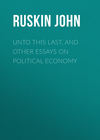
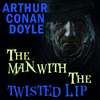

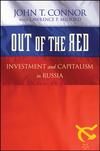

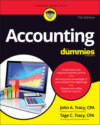



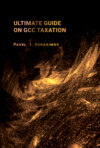
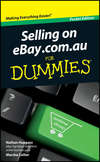
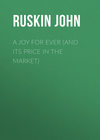







![Stones of Venice [introductions]](https://cdn.litres.ru/pub/c/cover_100/34843654.jpg)
